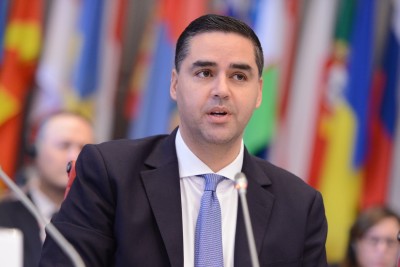OSCE Chairman-in-Office Ian Borg Ensures Organizational Continuity During Leadership Transition
In the absence of consensus on the appointment of a new leadership for the Organization for Security and Co-operation in Europe (OSCE), the Chairperson-in-Office, Malta's Minister for Foreign and European Affairs Ian Borg, has taken important steps to ensure the Organization's ability to operate during this transitional period.
 Ian Borg emphasized that it is the shared responsibility of the 57 OSCE States to ensure the integrity and functioning of the Organization during the current leadership transition. / Picture: © OSCE/Micky Kroell, ID 561914, (CC BY-ND 4.0)
Ian Borg emphasized that it is the shared responsibility of the 57 OSCE States to ensure the integrity and functioning of the Organization during the current leadership transition. / Picture: © OSCE/Micky Kroell, ID 561914, (CC BY-ND 4.0)
In his responsibility for executive functions and the coordination of ongoing OSCE activities, Minister Borg announced that Catherine Fearon, Director of the OSCE Conflict Prevention Center and Deputy Head of the OSCE Secretariat, will temporarily assume the duties of Secretary General. This measure entered into force on September 4, 2024, and will remain in place until a new leadership is appointed. This interim solution aims to ensure that the management of the Organization's human, financial, and material resources continues and that the OSCE can fully carry out its core tasks.
In addition to this key decision, Borg has appointed other senior officials to ensure continuity in the OSCE's three main institutions. Dr. Tea Jaliashvili, First Deputy Director of the OSCE Office for Democratic Institutions and Human Rights (ODIHR), has been given the responsibility to ensure the implementation of the ODIHR mandate until a new Director is appointed. This is particularly significant as the ODIHR plays a key role in monitoring elections, promoting democracy, and protecting European human rights.
Ambassador Marek Szczygieł, Director of the Office of the High Commissioner on National Minorities (HCNM), has also been tasked with ensuring the continued work of his office, which focuses on the protection of minority rights - an important aspect of the OSCE's mission to promote peace and stability. Similarly, Philippe Tremblay, Director of the Office of the OSCE Representative on Freedom of the Media (RFoM), remains responsible for the protection and promotion of press freedom, another central pillar of the OSCE's work.
In his address to the 57 participating states, Minister Borg emphasized the shared responsibility to safeguard the integrity and functioning of the OSCE. The Maltese Presidency continues to stand behind the pursuit of a solution that supports the core values of multilateralism and a functioning OSCE. At a time of growing geopolitical tensions and international uncertainties, it is of utmost importance that the OSCE can continue its work unhindered in areas such as conflict prevention, democratization, protection of human rights, and media freedom.
These developments illustrate the complexity of international diplomacy, especially in multilateral organizations such as the OSCE, where unity on leadership issues is often difficult to achieve. However, Minister Borg's actions demonstrate the Maltese Presidency's commitment to keeping the organization operational even in difficult times.



